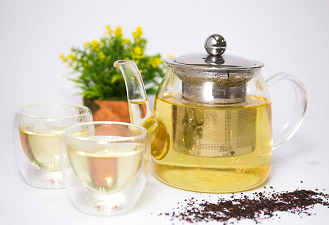
Is kratom tea really as controversial as people say it is? Opinions range from it being a miracle natural cure to a dangerous drug. So, what is the truth about kratom tea? Let’s explore and separate the myths from the facts.

Myth 1: Kratom Tea is the Same as an Opioid
Fact: Kratom contains alkaloids that interact with opioid receptors in the brain, but it is not an opioid.
One of the biggest misconceptions about kratom tea is that it is identical to opioids like morphine or heroin. While kratom contains compounds such as mitragynine and 7-hydroxymitragynine, which bind to opioid receptors, its effects are significantly milder and different in mechanism. Unlike synthetic opioids, kratom does not depress the respiratory system to the same extent, which reduces the risk of overdose. Additionally, kratom’s stimulating effects at lower doses are not characteristic of opioids. Many people use kratom tea for energy, focus, or pain relief, but it lacks the extreme sedative and addictive qualities associated with opioids.
In short, kratom tea is not afn opioid, though it shares some pharmacological interactions. Understanding this distinction is key to having clear discussions about its safety and benefits.
Myth 2: Kratom Tea is Highly Addictive
Fact: Kratom has the potential for dependence, but its addictive properties are lower compared to traditional opioids or stimulants.
Addiction is a complex topic. While kratom can create dependence if used excessively or irresponsibly, it’s not fair to classify it as “highly addictive” like heroin or methamphetamine. Regular, heavy use of kratom can cause tolerance, meaning a person may need higher doses to achieve the same effect. Some people who stop using kratom after prolonged use may experience mild withdrawal symptoms like fatigue, irritability, or cravings. However, compared to prescription opioids or alcohol, kratom’s addictive potential is lower. Most users consume kratom tea moderately without developing any dependency. Responsible and mindful use is key.
Tip: Don’t know what kratom is? Read about it on our blog
Myth 3: Kratom Tea Causes Severe Side Effects
Fact: Most people experience mild and manageable side effects, especially with moderate consumption.
Kratom tea can cause side effects, but severe harm is often exaggerated. Common mild side effects include nausea, dizziness, or an upset stomach, especially for new users or those who consume high doses. The most serious side effects are typically associated with excessive, long-term use or mixing kratom with other substances such as alcohol or medications. Much of the fear surrounding kratom’s risks comes from isolated reports of misuse. For people who use kratom tea responsibly and in moderation, side effects are minimal.
Myth 4: Kratom Tea Has No Medicinal Value
Fact: Kratom tea is used by many to manage pain, improve focus, or support mood, though research is ongoing.
Kratom tea has legitimate benefits. People in Southeast Asia have traditionally used kratom leaves for centuries to manage pain, fatigue, and anxiety. Today, anecdotal reports and early studies suggest that kratom tea may help with:
- Pain Relief: Kratom’s alkaloids interact with pain receptors, offering a natural alternative for mild to moderate discomfort.
- Energy Boosting: At lower doses, kratom tea acts as a stimulant, improving focus and productivity.
- Mood Support: Many users drink kratom tea to ease stress, promote relaxation, or uplift their mood.
Although scientific research on kratom is still limited, growing evidence and personal experiences suggest its potential value for those seeking natural support.
Myth 5: All Kratom Tea is Unsafe
Fact: Kratom tea can be safe when sourced responsibly and consumed in moderation.
Concerns about kratom safety often arise from unregulated products and poor-quality sourcing. Some kratom sold on the market may be contaminated with heavy metals, pesticides, or harmful additives. This is why sourcing high-quality, lab-tested kratom is essential. When prepared safely and consumed responsibly, kratom tea is no more dangerous than coffee or herbal teas.
Key precautions include:
- Choose trusted vendors that test their kratom for purity and safety.
- Start with small amounts to find the right dose for you.
- Avoid mixing kratom tea with other substances, especially alcohol or sedatives.
By taking these precautions, kratom tea can be a safe and enjoyable addition to a wellness routine.
Tip: Not really interested in kratom? Read about matcha.
Myth 6: Kratom Tea is Illegal Everywhere
Fact: Kratom legality varies by region, but it is legal in many countries and U.S. states.
It’s a common misconception that kratom tea is illegal everywhere. In reality, kratom is legal in many parts of the world, including most U.S. states, where it remains unregulated or specifically permitted. However, a handful of regions have banned kratom due to misunderstandings about its effects. Always check your local laws before purchasing or using kratom tea to ensure compliance.
Advocacy efforts are pushing for more nuanced regulation of kratom rather than outright bans. Responsible use and education will play a key role in shaping kratom’s future.
Conclusion: Let’s Separate Myths from Reality
Kratom tea has been both demonized by the media and sensationalized by passionate users, but the truth lies somewhere in the middle. It is not a magical cure-all, nor is it an imminent public health threat. By dispelling myths and focusing on facts about kratom, we can better understand the tea and its potential.
If you’re considering kratom tea, start with small doses, source from reputable vendors, and listen to your body. Like many natural remedies, kratom’s benefits depend on mindful and responsible use.
Ultimately, knowledge is the best tool for clearing up misconceptions. By focusing on science, personal experience, and balanced information, kratom tea can be appreciated for what it truly is: a centuries-old plant with potential benefits when used thoughtfully.






